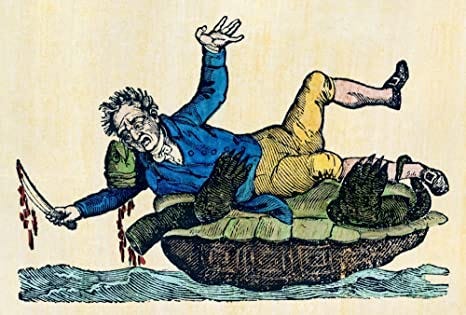James Madison and the Debilitating American Tendency to Make Everything about the Constitution
Beginning in the early 1780’s, and continuing through the ratification of the U.S. Constitution in 1788, James Madison of Virginia and Alexander Hamilton of New York worked as a team. They dragged the country kicking and screaming toward the creation of a national government that might, they hoped, do two related things: defeat democratic inroads on political power, made by ordinary people in the 1770’s and 80’s; and vitiate the legislative powers of the separate states, which had been lax, at best, in containing those democratic impulses. In 1789, when the first U.S. government went into operation in New York City, the partners hadn’t gotten all they’d wanted—the state legislatures still existed—but they’d gotten a lot, and as Treasury secretary, Hamilton went into action to bring about a system that he and Madison had long been working toward.
The system relied on federal taxation—no longer just duties on imports, but also taxes imposed domestically to create an “internal revenue,” drawn uniformly from the people , and earmarked for making annual interest payments to the small interstate class of rich speculators who had invested in federal bonds that helped pay for the war. The goal was threefold: concentrate the country’s wealth in a few, supposedly especially capable hands, and grow it; put the brakes on democratic innovations in public finance that had recently gained traction; and flood the separate states with federally consolidated police power. With Hamilton in the executive branch and Madison in the House of Representatives, they’d gained a strong foothold for at last achieving those shared goals.
It didn’t go that way. Even the most casual reader of founding history knows that Hamilton and Madison became opponents on pretty much every issue—that the Hamilton-vs.-Jefferson binary, which came to define the fundamental national conflict, is really a Hamilton-vs.-Jefferson-and-Madison binary. In Jefferson, Madison found a new partner. He spurned everything he and Hamilton had been trying to bring about. It was a nasty breakup, and Hamilton didn’t even see it coming.
Everybody has a plan, it’s said, until they get punched in the face. Hamilton took his punch in Federal Hall, in New York City, in early 1790, when the House was debating his proposal that Congress fully fund the federal war debt—to pay, that is, the small class of bondholders regular interest, for decades to come, at nearly the bonds’ face value, despite the real value’s having plunged in the market. (This isn’t the place to go into why Hamilton saw a massive investor-class payoff and bailout as nation-building, but he had cogent reasons.) In the debate, some Hamilton opponents—most loudly and passionately the choleric James Jackson of Georgia—proposed to discriminate between classes of bondholders. It might be OK to pay, at the value Hamilton proposed, those who had bought war bonds directly from the federal government, and those who had been issued federal chits for army pay and impressed supplies—but anyone who had bought bonds and chits in secondary speculative markets should be paid at the deeply reduced market rate. The original holders, the opposition said, had made patriotic sacrifices. The speculators had exploited that class by buying up the paper cheap in hopes of lining their pockets on the rise that Hamilton was now proposing to make law.
Discrimination can sound good. The distinction between soldiers, small farmers, and artisans on the one hand and greedy speculators on the other was real. Yet the idea made no real sense operationally, and it would have defeated Hamilton’s and Madison’s longstanding effort to make the wealth of the nation a dynamic force. Jackson was scoring points by standing up for the little guy and railing against moneymen, yet many of those moneymen were both “original holders” of war bonds and eager “speculators” in the bond and chit markets. Discrimination would only have benefited them, while failing to get any money into the pockets of the poorer people whom Jackson claimed to be championing.
So the discrimination idea, never very serious anyway, was easily argued down by Hamilton allies like Fisher Ames of Massachusetts. Time to move on.
But no.
Now James Madison rose to speak. And to Hamilton’s gobsmacked horror, he was speaking in favor of discrimination.
Bringing the goofy idea back from the dead, Madison proposed his own discrimination amendment, and unlike Jackson, who tended, Ames said, just to “re-bellow” his points, Madison had gravitas, sway, and command of nuance. He drew sniffles in the body by hymning the virtues of the common man, though he’d long worked with Hamilton to obstruct ordinary people’s efforts to gain some degree of equality. He joined in states-oriented critiques of federal finance efforts, though he’d long worked with Hamilton to reject those critiques. Thus did Madison tacitly announce the breakup. Hamilton remained stung and amazed for a long time.
But that was only Breakup Phase One. Throughout the long and agonizing debates on funding the federal debt, and assuming the states’ debts in it, Madison did little more than run the clock and message his newfound support for states’ rights and ordinary citizen. His dilatory tactic was to propose lengthy, unworkable alternatives that went down to inevitable defeat; in the end, he acquiesced in more or less everything Hamilton wanted.
He couldn’t argue very hard, for example, against Hamilton’s proposed excise on whiskey. Only months earlier, he’d advised his friend that an excise on whiskey was a good idea.
It was Breakup Phase Two that changed everything—for the founders and for us.
With funding, assumption, and excise accomplished, Hamilton proposed forming a national bank. Madison opposed national banking. But this time, instead of vaguely endorsing Hamilton’s general ideas and proposing silly, states-rights-ish alternatives to them, he mounted a full-on opposition to Congress’s ever chartering a bank. That made the breakup not tacit but open.
In opposing the bank, Madison was not actually taking a position at odds with his former positions. In 1782, even while working on behalf of increasing the Continental Congress’s powers and instituting federal taxation, he’d voted against giving a bank a congressional charter. Scholars argue about whether that was a principled objection to a potential for corruption or an interested defense of financial powers in Virginia. Or both.
Now, however, with the national-bank proposal, Madison was clearly opposing anything that might tend to undermine state-chartered banking and concentrate economic power in the urban North. But what changed everything was the basis of the fight.
Madison didn’t attack the bank as bad policy and argue the downsides on their merits. He ruled out the question wholesale. He called forming a bank unconstitutional.
That was just plain weird. To Hamilton and his supporters, it seemed glaringly obvious that everything the federal government might legitimately do can’t, of course, be enumerated; implied powers naturally exist, and the constitutional language even notes their existence. One may agree or disagree with that position. The important thing is that Madison agreed with it; if anything, Hamilton had gotten the idea of implied powers from him. (So go ahead and disagree with implied powers if you want—just know that the great author of the original attack on them had no consistent argument.) In criticizing the bank, not as a bad idea but as illegitimate on its face, Madison took what was manifestly a policy disagreement—manifestly to him!—and rendered it essentialist, absolutist, constitutionalist.
He, Hamilton, and others had made the Constitution as top-down as possible, with as energetic a federal government as possible. And yet re-reading the document, Madison suddenly discovered that it actively disallowed any federal power not expressly granted. A total one-eighty, made on a purely political basis. Not so edifying.
And the rest is history. Bad history, as we like to say here.
The vacuousness of Madison’s position had to have been clear to him (much ink has been spilled trying to read the Virginian’s mind). He was slippery as hell, but his behavior going forward suggests that whatever he may have been pleased to think about his own seriousness, he placed no practical value on sincerity in anti-federal-bank constitutionalism. What we’ve been taking seriously for so long, as a fundamental American disagreement on the deepest foundational principles, was attended by no such seriousness at its creation; it served only to bring about a nuclear-level rhetorical escalation in a political contest. Madison was soon taking these essentialist, values-oriented, constitutional positions in reaction to many of Hamilton's legislative efforts; he later renounced or ignored them, without seeming to worry about any impact on the Constitution. When in the minority, he and Jefferson condemned as un-American Hamilton’s effort to shift the American economy to manufacturing; in power, they adopted a pro-manufacturing agenda. They ran against Hamiltonian displays of militarism in the quasi-war with France and then made a war of choice on Britain. When the bank charter on which they’d first focused their constitutionalist wrath finally expired, the state banking they’d championed caused chaos for the federal government. So they started a new national bank.
Jefferson had it in him to wring his hands over the contradictions. I don’t think Madison did, really.
The problem they handed us began with the bank and has continued and developed throughout our history. It may at times have served as a kind of gift. It’s a lot easier and more fun to yell about constitutionality than to mount a persuasive case for or against some controversial piece of legislation. The early divide on the Constitution is also attractively teachable.
In the end, though, this kind of hyperconstitutionalism has dragged our debates down and undermined public understanding of the nature of national government. In close-up, the founding phenomenon that we like to cast as a philosophically fundamental divide looks like a lot of stale hot air. We’ve been living in a fantasy, so fully worked into the public sense of American history and civics that it can be hard to imagine ever getting back to some sense of reality.
A first step might be to question the kneejerk, repetitive appeals to constitutionality that pervade public discourse. James Madison hasn’t always been our friend. Another might be to notice the similarities, in certain practical terms, of Hamiltonianism and Jeffersonianism. That great binary—ever so teachable!—hasn’t always been our friend either.



